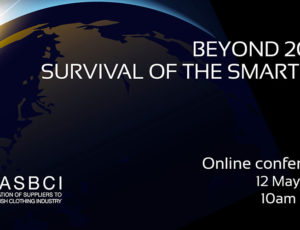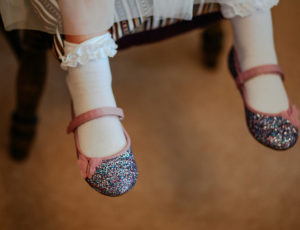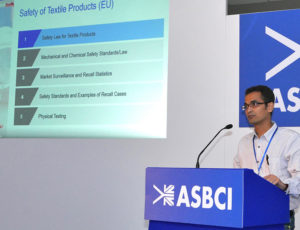ASBCI: Beyond Covid, beyond Brexit, what is the future for the UK fashion industry?

The rise of customisation and on-demand and the demise of wasteful mass-production business models were among speakers’ predictions at the Association of Suppliers to the British Clothing Industry (ASBCI) Survival of the Smartest digital conference on 12 May.
The future will be smarter, more agile and more personal, with a higher percentage of product made closer to home. Innovative new distribution models will emerge in response to the rapid acceleration of the multi-channel ecommerce strategies that have transpired from successive lockdowns.
To meet these new demands, transform the industry in the wake of Covid, and in response to the climate crisis, the industry must get smarter, said Marcella Wartenbergh, CEO of AWWG. Digital transformation across the entire supply chain is essential; maximising efficiency, speed to market, and the customer experience while delivering sustainability benefits including reducing waste and shrinking carbon footprints.
Keynote speaker Ed Gribbin, CEO of Gribbin Strategic, was the first to highlight the rise of customisation and the role of on-demand in the future of more responsive, more responsible production.
“The idea that we can decide two years out what people will buy is crazy,” says Gribbin. “The old model of sell what you can, mark down the rest, and get rid of the balance is doomed to fail and Covid has accelerated this. We need smarter design, planning, manufacturing, logistics and fulfilment, and computing power will help us get there. But while tech is exponential, humans are linear. Humans have to harness technology and our ideas may not move at the same pace as tech capabilities.”
Several speakers picked up on this theme, including Steffen Meiler, Lectra’s sales director for Northern Europe. “Mass production should no longer be the default,” he agrees. “Customer centricity is key going forward. The pandemic has accelerated a move away from seasonal trends to made on demand. Increased focus on ethical and sustainability issues means it is time for the industry to switch to more manageable volumes of production.”
Lectra sees the future in terms of agile production and Meiler shared his checklist of the technological requirements. These include single-ply cutting and digitalisation and system interoperability as a key to a smooth process and to enable a quick response to individual orders. “It is time for bold CEOs and business leaders to drive the change,” he says.
Jenny Holloway from Fashion Enter also picked up on the theme of customisation.
Fashion Enter is a not-for-profit social enterprise and centre for excellence with manufacturing facilities in London and Wales. In collaboration with ASOS and Kornit Presto direct-to-fabric printing, the company is setting up a made-on-demand micro production line.
“This will be a one-piece flow,” says Holloway. “The customer will put in the order through ASOS. We will print the fabric, cut it out, sew the garment, and then handle fulfilment to the customer direct from the factory. It is hard for people to understand that this will be the future when they are used to mass-producing standard items. But I think there will be a time when more of these distributed-manufacturing relationships are formed between retailers and factories. Retailers shouldn’t need fulfilment centres all over the country. Everything is changing. Anything new is scary, but we have to embrace change and make it work.”
Digital psychology expert Andrew Nicholson from Kulea.ma discusses changes in consumer behaviour during the pandemic.
“’A decade in days’ has been used to describe the acceleration of consumer digital adoption,” he says. “Then there’s the economic downturn and decreased spending coupled with Gen Z’s emphasis on more durable, sustainable fashion. Finally, a preference shift has seen shoppers shop less frequently but buy more in one session, creating opportunities for supplementary purchases.
“Consumers have formed new habits over a year of lockdowns. To break those habits, retailers need to create an augmented experience that combines the immersive, social, and familiar experience of in-store shopping with the convenience of digital. The digital acceleration won’t stop. We have to accept that the future is an amalgamation of the two experiences.”
Frazer Mead, head of sourcing, fashion, at The Very Group agreed. He states that the increased expectations of consumers will require online retailers to find ways to combine the social, experiential aspects of shopping with the convenience of online. Addressing what these changes mean for brands and retailers at a supply chain level was Stuart Greenfield from Advanced Supply Chain Group. Also, David Flavell, head of inbound supply chain at ASOS.
Meanwhile, Adam Mansell, CEO of the UKFT, addressed the impact of Brexit on the UK fashion industry.
Mansell predicts the combination of pandemic-induced changes and Brexit pressures could see a return of UK manufacturing at scale. However, both the industry and Government need to invest in its success. Plus, five things need to happen first: retailers need to prioritise business models that focus on net margin; Government needs to mandate 10% UK-made as part of public procurement; there must be recognition of the breadth of the industry and its possibilities; investment in a recycling infrastructure; and also the implementation of a skills and careers programme to meet the needs of the industry into the future.
Providing an overview of the conference is ASBCI chairman, Dr Alistair Knox.
“The Survival of the Smartest conference saw some of the biggest names in the industry address the most pressing challenges of the next few years; speaking candidly about the challenges they have faced while sharing details of successful strategies. I am delighted with the success of the Beyond 2020 event series.
“As with every other business, the ASBCI has had to change with the times while continuing to deliver the content our members rely on to operate successfully in this exceptionally difficult period. With our very first digital event series, we have done just that. I would like to thank everyone who helped make these events possible; from our speakers to our sponsors and our technical partners.”
Chairing the conference was Dr Julie King, deputy dean at the University of South Wales and also ASBCI event director. The event was organised with event technical partner Lectra and also sponsored by Advanced Supply Chain Group.
For further information on the ASBCI, please click here.












